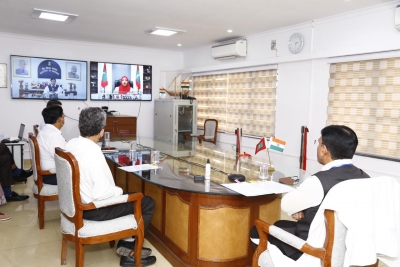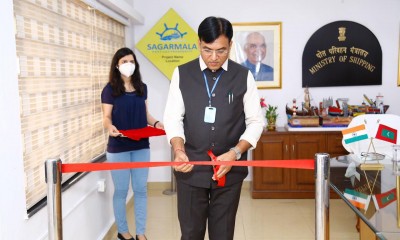
 New Delhi, Sep 21 : In a landmark development, a direct cargo ferry service between India and Maldives commenced on Monday. This is the first time that a direct cargo shipping line is connecting the two neighbouring countries.
New Delhi, Sep 21 : In a landmark development, a direct cargo ferry service between India and Maldives commenced on Monday. This is the first time that a direct cargo shipping line is connecting the two neighbouring countries.
The ferry service, which was first announced by Prime Minister Narendra Modi in June 2019 during his visit to Maldives, was launched in an e-flag off ceremony hosted jointly by Minister of State (independent charge) for Shipping Mansukh Mandaviya and Aishath Nahula, Minister of Transport and Civil Aviation, Maldives .
Commencement of a cargo ferry service between India and Maldives was announced by the External Affairs Minister S. Jaishankar during his virtual meeting with the Foreign Minister of Maldives, Abdulla Shahid, on August 13.
The ferry service will run twice a month. It will be operated by the Shipping Corporation of India on a vessel with a capacity of 380 TEUs.
The ferry will herald direct connectivity for movement of cargo between India and Maldives, giving a boost to bilateral trade.
Despite geographical proximity, India is currently only the 4th largest trade partner of Maldives. Maldives imports more from the UAE, China and Singapore, implying that bilateral trade with India is not commensurate with it’s potential.
India’s bilateral trade has hovered at around $280 million annually for some years now and stood at $286.85 million in 2019.
Direct ferry will reduce transportation cost, provide a timely, short and cost-effective means of transportation for goods from India to Maldives and thereby incentivise more trade between the two countries.
The ferry has cold storage facility, which will also allow more exports from Maldives of tuna fish and other marine food items which are specialties of Maldives.
In March-April this year, FICCI’s Kerala state council conducted a study on the viability of a ferry service between India and Maldives. The study found that for 27 principal import items of Maldives, India’s share of imports is well below their potential.
Currently, maximum imports to Male originate from Dubai, China, Singapore and Colombo, while Dubai, Singapore and Colombo are mostly transhipment ports. A direct and reliable service will provide an alternate and cost effective way of transportation of goods from India to Maldives.
Since Maldives is a 100 per cent import dependent country, improved connectivity between India and Maldives will help boost bilateral trade and help economic acitivity in Maldives, already reeling under the disruption brought about by Covid-19.
The Covid-19 crisis has, drawn the attention of the world towards resilient supply chains. In May-June this year, while Maldivian imports have fallen by 50 per cent, India has become the second largest exporter to Maldives. India has, therefore, proven that it can provide supply side security to the Maldives during such uncertain times.
A number of bilateral projects are in the pipeline, owing to which export of construction material and other commodities from India to Maldives is bound to rise in the coming months. This includes the Greater Male Connectivity Project (under $400 million LOC and $100 million grant), and projects under the $800 million Line of Credit.
There is great enthusiasm on both the sides for the launch of this service. FICCI organised three virtual roadshows in Tuticorin, Kochi and Mumbai to publicise this service. The response from exporters has been positive.
During its maiden journey, the ferry will make a stop at Kulhudhuffushi port in North Maldives before it reaches Male on September 29.
The Maldives government is making concerted efforts to revitalise the economy of Northern Maldives. It is understood that in order to give financial incentives, the Maldives Majlis has approved 50 per cent reduction in custom duties for import items cleared at the Kulhudhuffushi port. India has also been assisting the Maldives government in developing its Northern region through a number of bilateral projects/ initiatives.
This service will improve regional connectivity. The government has been working to promote a number of initiatives and projects in order to increase regional connectivity in the Indian Ocean region.
Disclaimer: This story is auto-generated from IANS service.

